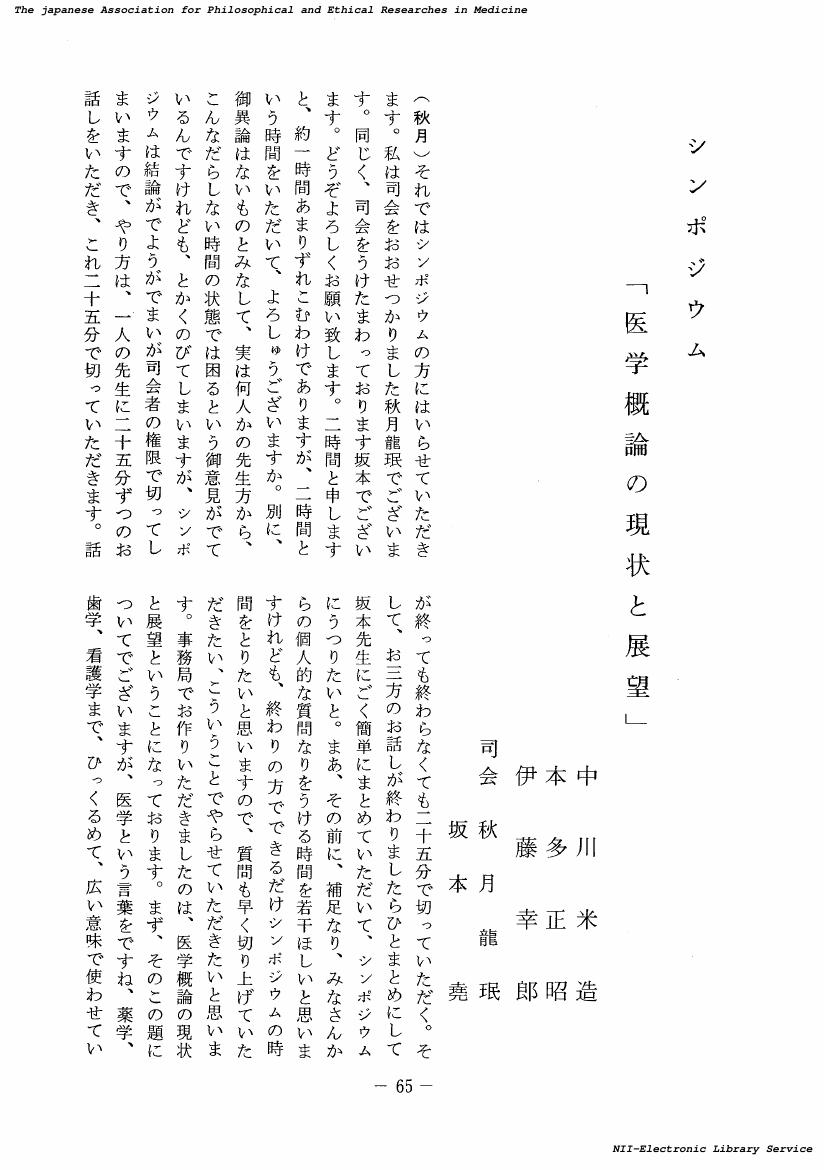2 0 0 0 OA 終末論の歴史的考察
- 著者
- 坂本 堯
- 出版者
- The Japan Society of Christian Studies
- 雑誌
- 日本の神学 (ISSN:02854848)
- 巻号頁・発行日
- vol.1973, no.12, pp.178-187, 1973-09-10 (Released:2009-10-23)
1 0 0 0 OA ターミナルケアに宗教的援助は必要か
- 著者
- 山本 善次郎 坂本 堯 高橋 勝
- 出版者
- 日本医学哲学・倫理学会
- 雑誌
- 医学哲学 医学倫理 (ISSN:02896427)
- 巻号頁・発行日
- vol.8, pp.25-34, 1990-07-31 (Released:2018-02-01)
A survey on terminal care was conducted in St. Marianna University School of Medicine in 1988. The results show: a) ST. Marianna staff members have a strong interest in terminal care; b) few of them consider religious support necessary for terminal patients; c) St. Marianna staff members recognize it's time to discuss hospice and hospice care earnestly. In our country, religious indifference is really quite persistent in this generation. Nevertheless, many terminal patients want religious support as well as psychochiatric support. With considerable experience of clinical pastoral care for terminal patients in the hospital, we are convinced that they need religious support.
1 0 0 0 OA 哲学の立場から(シンポジウム 医療倫理教育の在り方)
- 著者
- 坂本 堯
- 出版者
- 日本医学哲学・倫理学会
- 雑誌
- 医学哲学 医学倫理 (ISSN:02896427)
- 巻号頁・発行日
- vol.7, pp.74-84, 1989-07-31 (Released:2018-02-01)
Opinions concerning the essence of medical ethics, their significance and their educational methods differ fundamentally according to one's religious and philosophical orientation. Many questions of medical ethics have to do with the most difficult, eternal, and probably insoluble questions concerning what we know about the essence of human beings and the meaning of truth, love, values, happiness, etc. Problems which reappear in the course of history must be considered from many viewpoints. From the Meiji Restoration in the middle of the nineteenth century until the present, Japan has imported Western science, particularly medicine, at an extremely rapid rate, with the result that traditional methods of Oriental medicine have come to be looked down upon. Unfortunately, these cultural changes have caused a lot of turmoil in the area of medical ethics in Japan and this is due to overestimation of the value of European technology and natural sciences. As a result, it would not be too much to say that an indifference to ethical considerations and a related high degree of selfishness and greed are present in many sectors related to health care in Japan today. However, it is comforting to note that there is some movement for the improvement of this situation. Against this background, it is the purpose of this report to examine certain considerations related to these movements as follows: 1) the history of European medical ethics; 2) the history of European philosophy and religion; 3) the humanism of Nicholas of Cusa; 4) the educational thought of Maria Montessori.
1 0 0 0 OA 死をめぐる諸問題 : 医療と哲学・倫理学の接点として
- 著者
- 山本 俊一 清水 昭美 アンセルモ マタイス 矢次 正利 坂本 堯
- 出版者
- 日本医学哲学・倫理学会
- 雑誌
- 医学哲学 医学倫理 (ISSN:02896427)
- 巻号頁・発行日
- vol.4, pp.105-139, 1986-06-30 (Released:2018-02-01)
1 0 0 0 OA 医学概論の現状と展望
- 著者
- 中川 米造 本多 正昭 伊藤 幸郎 秋月 龍[ミン] 坂本 堯
- 出版者
- 日本医学哲学・倫理学会
- 雑誌
- 医学哲学 医学倫理 (ISSN:02896427)
- 巻号頁・発行日
- vol.2, pp.65-94, 1984-10-20 (Released:2018-02-01)


